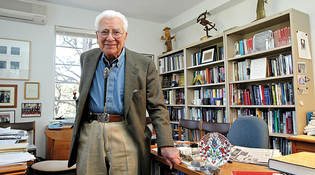 loading
loading
MilestonesMurray Gell-Mann, 1929–2019A prodigy who uncovered subatomic secrets—and won a Nobel Prize.  Sante Fe InstituteAt age 14, Nobel laureate Murray Gell-Mann ’48 entered Yale and began a world-changing career in physics. View full imageMurray Gell-Mann ’48, a founder of particle physics who won the Nobel Prize for his discovery of the smallest and most fundamental parts of the universe, died on May 24 at age 89. He was best known for his role in physics, but his life’s work—searching for patterns and regularity in complex systems—was reflected in everything he did. In the 1950s and ’60s, the field of particle physics exploded. More than 100 individual particles had been discovered, and scientists struggled to organize and understand their interactions. In 1961, Gell-Mann discovered that hadrons—composite particles, like protons and neutrons—were arranged as, and therefore could be classified as, octets. From there, he posited the existence of quarks, elementary particles from which hadrons are made. “It’s a kind of weird hypothesis—all these invisible things that no one has seen,” says Steven Girvin, the Eugene Higgins Professor of Physics. “But all of these strange hypotheses led to a very simple story.” In 1969, after the existence of quarks was confirmed, Gell-Mann won the Nobel Prize for Physics. Gell-Mann was born in 1929 in New York City. A scholarship student at his prep school, he graduated as valedictorian at age 14 and went on to Yale. He argued with his family over his major: his father pushed for engineering, while Gell-Mann was drawn to archeology or natural history. They compromised on physics—a field Gell-Mann knew little about. After Yale, Gell-Mann earned his PhD at MIT and eventually began teaching at Caltech. In 1984, he cofounded the Santa Fe Institute, an independent think tank that promotes interdisciplinary approaches to science. Gell-Mann was said to speak 13 languages fluently; he was famous for telling people how to pronounce their names properly. Though cantankerous, he was a generous mentor, and enraptured by the possibilities of the world around him. “Our work is a delightful game,” he said in his Nobel Prize acceptance speech. “For me, the study of [natural] laws is inseparable from a love of Nature in all its manifestations.” He finished the speech in fluent Swedish, and later berated himself for mispronouncing a single word.
The comment period has expired.
|
|